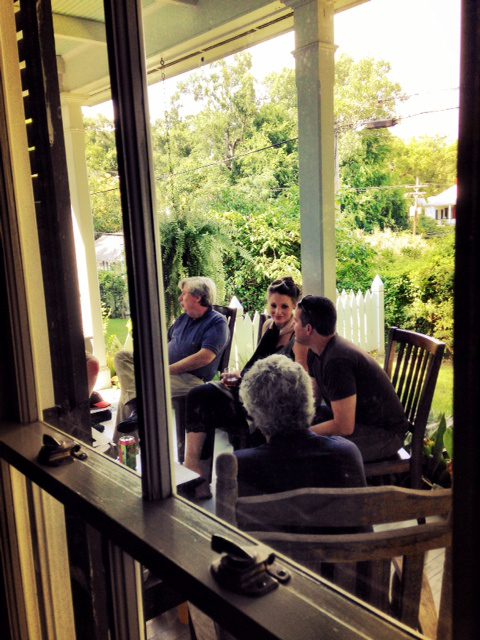Peter Augustine Lawler, RIP

I received the news this morning that my friend Peter Augustine Lawler had died. It is always shocking to learn that a friend has passed, but this was a particular blow, because we about to celebrate the 2017 Walker Percy Weekend. Peter was a vital part of the first two Walker Percy Weekends, because he was a Catholic scholar who loved Percy and who loved the South, though not uncritically. Here is a terrific essay Lawler wrote about the mind of the South. Excerpt:
Southern literature at its best is a critical account of the mind of the semi-dispossessed aristocrat. Faulkner and Walker Percy, for example, let us see the self-deception at the core of racist paternalism, as well as the neglect for the truth about natural rights taught by Jefferson. But they also let us see how empty middle-class life is from an aristocratic view, and how clueless those who so methodically devote themselves to the pursuit of happiness are about what human happiness is. True individualism, from this view, regards rights not as rooted in calculated interests but as points of honor to be exercised honorably.
Among the instances in which Southern Stoic virtue has elevated the American mind, the most obvious is Harper Lee’s character Atticus (note the name) Finch in To Kill a Mockingbird. Atticus’s virtue had nothing to do with Christian charity or the liberal understanding of rights. He was courageously and paternalistically taking responsibility for his inferiors, for those who couldn’t defend themselves against the vicious mob that threatened the rule of law in the decadent South.
And then there are the Stoic characters of Tom Wolfe. There’s one who becomes “a man in full” by reading Epictetus, and so knows what to do as a rational man completely isolated in a maximum security prison. There’s also the star basketball player in I Am Charlotte Simmons who learns how to treat women and regains his manly self-confidence through absorbing—making his own—his professor’s very Stoic reading of Aristotle. In Wolfe’s novels, the foundation of coming to live according to this version of natural perfection has nothing necessarily to do with being raised with Southern “class,” but he shows us that, in the classically Southern version, becoming a member of the class of rational, responsible, relational men is a possibility available to us all.
Wolfe, by reminding us that it’s barely possible but highly countercultural to live as a natural aristocrat in our clueless and trashy time—when our institutions of higher education are the most clueless and most trashy parts of American life—frames a narrative of American moral and intellectual decline. His nostalgia for the past is meant to be selective, and it is meant, of course, to inspire personal action in the present. The purely Southern mind—like all aristocratic narratives—is a reflection on our movement away from what was best about the past. And so the Southern mind is anti-progressive, even as it suggests, with Aleksandr Solzhenitsyn, that the one true progress is toward wisdom and virtue in a particular human life.
Peter’s final essay appeared this morning in Public Discourse. It’s a meditation on Allan Bloom’s “The Closing of the American Mind,” and it’s meaning for us today. Excerpt:
When it comes to the less elite sectors of our society, resistance to the linguistic therapy of the cognitive elite’s newly aggressive niceness takes a different form. Our anti-elite perceives itself as being stripped of the dignity that comes with being responsible citizens and having the wherewithal to raise a family. Their revolt is not only concerned with the compensation, security, and status of “skilled labor.” It also attempts to defend the opinions and beliefs of loving spouses, parents, citizens, and religious believers from corporate scripting. From the perspective of these rebels—Trump voters in our country and Brexit voters in Great Britain—the nice are lacking in real virtue, particularly personal courage and civic commitment. And they have been parasitic for their defense on those who orient their relational lives by God, country, and family.
I’m far from endorsing Trumpism, which attempts to counter being nice with being brutal. But there’s a lot to be said for any effort that restores the country as a real source of human loyalty and reminds us of the nobility and indispensability of relational virtue.
Bloom believed that, in an enlightened country, the thoughts of the sophisticated eventually transform the lives of everyone. We might have more reason than he did to hope that our story won’t be that simple. Now’s the time to praise manliness, but only in the context of showing the road from anger, meaninglessness, and despair to a world once again full of ladies and gentlemen—people who know who they are and what they’re supposed to do as beings born to know, love, and die, and designed for more than merely biological existence.
Peter Augustine Lawler knew who he was and what he was supposed to do.
Devastated. Just devastated.
That is how everyone at the Intercollegiate Studies Institute feels today after learning that our friend Peter Augustine Lawler has passed away.
Actually, devastated is an understatement. Peter has played such an important role in ISI’s educational program for so long, and has been a friend, mentor, and teacher to so many, that it is almost impossible to imagine an ISI program in which he won’t play a major part. He has been an ISI stalwart for decades. He was a magnificent and beloved teacher, not least because he challenged students in ways that most professors never do. Peter taught in the ISI Honors Program for many years, becoming a mentor to countless ISI students. He was one of ISI’s most popular campus lecturers as well. Frankly, he is irreplaceable.
I will always remember him like he appears in the photo below: sitting on my front porch at the first Walker Percy Weekend, in a rocking chair, surrounded by bourbon-drinking Southerners (and aspiring Southerners) who enjoyed the pleasure of his company. RIP.


Subscribe for as little as $5/mo to start commenting on Rod’s blog.